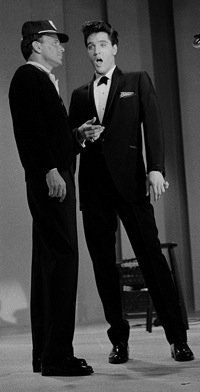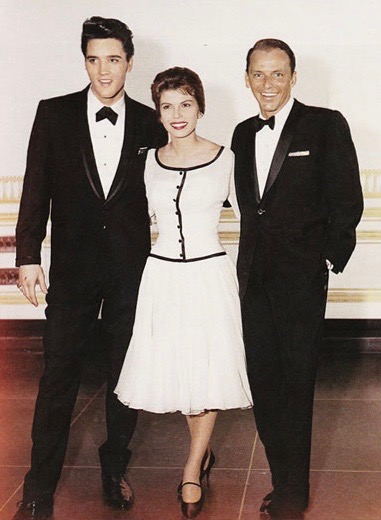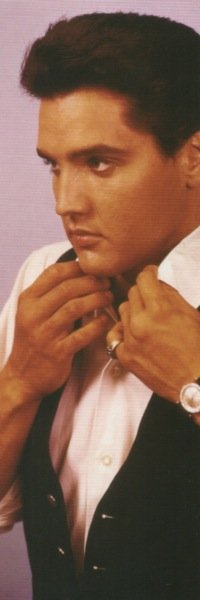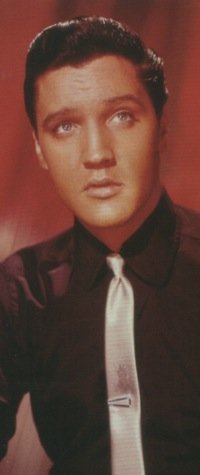Elvis History Blog
Presley and Sinatra
More in Common Than You Might Think
I have to admit that I have never liked the sound of Frank Sinatra’s voice. Despite all the pronouncements of Frank’s smooth delivery and how he was the best at phrasing lyrics, I’ve always thought that Elvis was a better singer in both respects. Then, despite the two men being a generation apart, there was always the public perception that they were somehow in competition with each other, and I’ve never liked anyone that others thought was better than Elvis. (A childish attitude, I admit.)
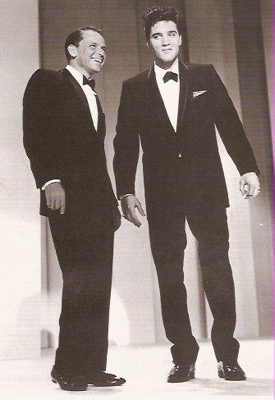
In the early years of Elvis’ booming success, journalists asked both men to comment on the other. Interviewed on the set of Pal Joey in June 1957, Sinatra named Pat Boone as “the best of the new talent.” Asked specifically about Elvis, Frank said it was too early to judge whether or not he was a “freak.” He added, “They said I was a freak when I first hit, but I’m still around. Presley has no training at all. When he goes into something serious, a bigger kind of singing, we’ll find out if he is a singer. He has a natural animalistic talent.”
Elvis, on the other hand, was very guarded when he spoke about Sinatra in the fifties. During nearly all of his press conferences preceding his 1957 concert appearances, Elvis was asked to name his favorite singers. Among them he listed crooners like Dean Martin and Nat King Cole, but not Sinatra. At an April press conference in Canada, he was asked about Sinatra in particular. “I can take him or leave him,” was Elvis’s noncommittal response.
In Los Angeles on October 28, 1957, however, Elvis spoke pointedly about some comments Sinatra had recently made about rock ’n’ roll in a French magazine. Frank called rock ’n’ roll “the most brutal, ugly, degenerate, vicious form of expression it has been my displeasure to hear” and declared that “it is sung, played and written for the most part by cretinous goons.”
• Elvis accused Sinatra of taking unfair potshots at rock ’n’ roll
Although Sinatra didn’t mention Elvis directly, as the reigning “King of Rock ’n’ roll,” Presley was duty-bound to respond. “I admire the man,” Elvis said, choosing his words carefully. “He has a right to his own opinions. He is a great success and a fine actor, but I don’t think he should have said it. I don’t think anyone has the right to take potshots at something that is definitely a trend. It’s an American development, just like crooning was a few years back.”
Of course, any animosity between the two entertainers (if any really existed in the first place) was forgotten when Elvis made his first public appearance after leaving the army in 1960 on Frank’s network TV special. The two men seemed very much at ease performing together on stage that night. Afterwards they went their separate ways and only occasionally had personal contact with each other over the years.
Will Friedwald, the author of seven books on music and popular culture, discussed the Sinatra-Presley connection in an article published in the February/March 2005 issue of American Heritage magazine. Friedwald contends that one difference in the careers of Sinatra and Presley is that Elvis’s catalog of recorded songs looks meager compared to Sinatra’s. Of course, Frank’s longer lifespan meant he recorded more songs than Elvis, but Friedwald was referring more to the disparity in the quality of songs the two men recorded. He put the blame on Elvis’s publishing arrangement.
When Elvis first signed with RCA Victor in 1956, Colonel Parker had the firm of Hill and Range create a song publishing company for Presley. To maximize his client’s income, Parker insisted that Elvis record only songs for which Hill and Range owned the publishing rights. And throughout his career, Elvis rarely ventured outside H&R for recording material. Friedwald believes this restriction kept Elvis from recording many songs that would have been perfect for him.
• Elvis wasted too much time on mediocre songs
Sinatra, on the other hand, did not limit himself. “Sinatra had also owned publishing houses,” Friedwald explained, “but unlike Presley, that hadn’t stopped Sinatra from consistently recording the best songs he could find. Unfortunately, Presley was importuned to waste too much energy making mediocre songs—which he usually owned a piece of—sound better than they were.”
One related similarity between the two singers was that neither one claimed to be a serious songwriter. “The strength of both,” Friedwald contended, “was that they could interpret a song written by someone else, and make it into something considerably more magical, and even personal, than the guy who wrote it. Eddy Arnold was a first-rate country singer, but even he can’t touch Presley’s reading of his own ‘You Don’t Know Me.’”
Friedwald mentioned a conversation Frank Sinatra once had with his daughter, Nancy, a good friend of Elvis’ and his costar in the 1968 movie Speedway. Her father was critical of Elvis because he felt he’d never taken the opportunity through the years to grow as an artist. Nancy argued that the people around Elvis never allowed him to explore new creative avenues.
“Sinatra rejected that excuse,” said Friedwald. “From his perspective, we can’t blame him. The old man would never let anybody stand in his way in terms of choosing a song or finessing an arrangement or a recording mix to perfection. And this conversation represents a rare occasion in which Frank Sinatra discussed Presley as even potentially an equal or kindred spirit. But he was. They both were only children who demanded the company of an entourage around them when they grew up; they both were extremely devoted to their mothers; they were among the relatively few singers who attained superstardom in Hollywood; and they both had a lot of comebacks.”
• Like Sinatra, Elvis may have been better off as a “gangster”
It wasn’t as if Elvis didn’t care about how RCA mixed his recordings once he left the studio. Joe Esposito has described how Elvis worked with the studio engineers to mix his recordings, and then had an acetate pressed so he could compare it to the version that RCA released. He was often upset when the company altered the sound he created, but he rarely did anything about it. In such cases, Sinatra did do something about it.
Of Elvis, Friedwald noted, “Like Sinatra before him, he wanted to work only with the best actors and musicians and with superior songs. The difference between him and Sinatra was one of temperament. Sinatra, like Ray Charles, constantly made his own opportunities, and heaven help you if you got in his way. Perhaps Presley was too nice and civil a guy. Perhaps to stick to your standards in Hollywood, you had to be something of a gangster.”
Certainly both Elvis Presley and Frank Sinatra have achieved iconic status decades after their heydays. Both continue to make new fans who were not even born when their heroes died. Their styles may have differed, but their names will forever appear together at the top of the list of “The 20th Century’s Greatest Entertainers.” — Alan Hanson | © October 2008
Go to Elvis History
Go to Home Page
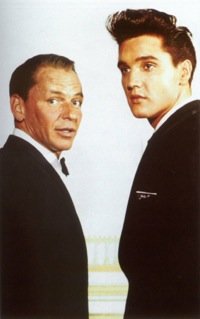
"The strength of both was that they could interpret a song written by someone else, and make it into something considerably more magical, and even personal, than the guy who wrote it."
